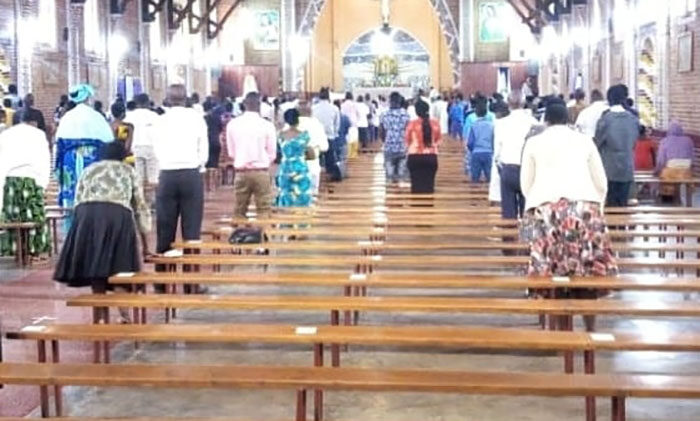
Churches open in Rwanda on 19, July 2020, with strict COVID prevention guidelines. Photo: Rwanda Broadcasting Agency
Churches in Rwanda have officially reopened after over four months of closure, but with strict conditions meant to limit the spread of coronavirus.
English language newspaper in the country, The New Times, reports that the decision came on Wednesday after a cabinet meeting in which officials announced new guidelines to which places of worship must abide.
As of 18 July, 2020, Rwanda had 1,539 COVID-19 confirmed cases, 819 recoveries and 5 deaths.
Local government officials together with the Rwandan Governance Board stressed that each Church would be reopened after an inspection to ascertain they meet the set restrictions.
They also urged that every house of prayer must have hand sanitizers, infrared thermometers and measures to uphold the use of face masks. The number of congregants is also very restricted to avoid overcrowding.
Below are the Dos and don’ts that places of worship must stick to.
Dos
1. Reopening of a place of worship will be approved by the District after a thorough inspection on safety measures by a responsible team from the sector administration. Meanwhile, places of worship located in areas under lockdown are not allowed to reopen.
2. Congregants are only allowed to give offerings using digital payments such as Mobile Money, Money transfer and Bank transfer to avoid the spread of coronavirus. Each place of worship should prepare a special place for congregants who bring non-monetary offerings.
3. The Holy Communion is allowed, but must be done in observance with safety guidelines against the coronavirus pandemic. Both priests and congregants should therefore wash their hands before attending the Holy Communion service and should avoid exchanging or sharing in the same container during the service. Self-service should be applied where possible.
4. Volunteers helping in the enforcement of COVID-19 measures must be deployed at every place of worship whenever there is a function.
5. A specific but limited number of congregants must be identified publicly at every place of worship.
6. The programme of prayers (days and hours) must be communicated to the public and to the sector administration for proper inspection.
Don’ts
1. Touching, hugging and shaking hands are prohibited. Congregants must also keep one metre (1m) of distance between them before and after prayers. Priests are not allowed to put their hands on congregants while praying for them.
2. Sharing church materials like microphone, Holy books is prohibited.
3. Children under 12 years of age are not allowed to gather at places of worship.
4. Places of worship are not allowed to open during curfew hours.
5. For a place of worship to reopen, an inspection team at the sector level does inspection and gives the report to the district for approval.
6. However, the same team does regular inspections at places of worship and has the authority to suspend it, in case of Covid-19 guidelines violation.

